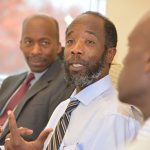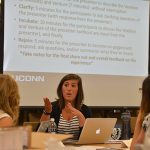While educators have long been encouraged to engage students in writing when teaching math, specific recommendations on how to leverage writing to enhance learning of mathematics have fallen short — until now.
After almost 20 years in a variety of positions at the University of Connecticut, Joseph Madaus, professor of educational psychology, has returned to the Neag School to serve as the new associate dean for academic affairs.
Catch up on some of the Neag School news highlights you may have missed this past summer with these quick links.
Robert Colbert, associate professor in the Neag School of Education, passed away on Friday, Aug. 12, 2016.
This past July on the Storrs campus, 11 current teacher leaders representing 10 school districts from across the state spent five days engaged in a variety of learning activities during the inaugural Teacher Leadership Academy. The academy, hosted by the Neag School of Education from July 25-29, 2016, and co-directed by assistant professors Rachael Gabriel, Jennie Weiner, and Sarah Woulfin, was designed to enhance participants’ ability to support high-quality instruction, create conditions for reform, and lead change in Connecticut schools.
Last week, the National Commission on Teaching & America’s Future (NCTAF) released a report aimed at helping educators reorganize the nation’s education system in ways that support teaching, drive learning, and provide all students with the foundation needed to build a successful future. Building on a report the Commission issued 20 years ago, it addresses current challenges facing the nation’s educators and makes recommendations focused on improving teaching and learning in the U.S.
Professor Richard Schwab, former dean of the Neag School and now Raymond Neag Endowed Professor of Educational Leadership, helped shape the new report, “What Matters Now: A New Compact for Teaching and Learning.” He describes it as a call to collective action ultimately intended to ensure that all students have access to great teaching.
Two Neag School faculty members in the Department of Educational Leadership have recently received funding — totaling more than $2 million — from the U.S. Department of Education’s Institute of Education Sciences (IES), as part of the latest round of grants issued by the National Center for Education Research (NCER)’s Education Research Grants Program.
What if we, as instructional leaders, supported creativity in teaching and learning? I mean really supported it. In short, we would see ourselves taking beautiful risks. Creativity expert and professor Ron Beghetto pens this blog post.
With 80 students currently majoring in the University’s human rights undergraduate program and another 40 to 50 enrolled as human rights minors, UConn stands out as one of just a handful of universities in the nation offering a degree program in the field of human rights.
But educating students in human rights issues need not be exclusive to college campuses, as Glenn Mitoma, assistant professor of human rights and curriculum and instruction, can attest.
As you watch this year’s summer Olympics, pay attention to the athletes from smaller countries. There’s a good reason why some countries manage to produce elite athletes consistently, even though they’re drawing from populations much smaller than those of China, Brazil, or the U.S. They cultivate them differently.









